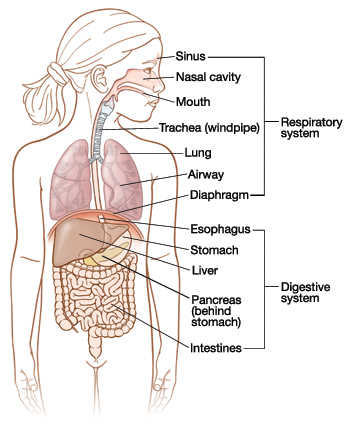When Your Child Has Cystic Fibrosis (CF)
Cystic fibrosis (CF) is a long-term (chronic) inherited disorder of the glands that make mucus and sweat (the secretory glands). CF can range from mild to severe. It's caused by an inherited gene defect. The defect affects a protein that regulates the amount of mucus and sweat made throughout the body. This leads to an imbalance in the water and salt that flow in and out of cells. It causes thick, sticky mucus that affects how organs work. Healthcare providers often diagnose CF in the first 2 months of a child’s life. CF is a disease that is part of the newborn screening done on all babies born in the U.S.
What parts of the body are affected by CF?
Cystic fibrosis often affects organs that make mucus, tears, sweat, saliva, and digestive juices. Secretions become thicker, so they don’t flow as freely. This can cause blockages. CF often affects the respiratory and digestive systems. It can also affect the reproductive system. In the lungs, thickened mucus can trap germs (bacteria). This can lead to serious infections. In the digestive system, the enzymes that break down food are blocked. Without them, the intestines can't fully absorb fats and proteins. This condition can lead to vitamin deficiency, problems staying at a healthy weight, and malnutrition. In later stages, your child may develop other chronic health conditions such as:
-
Diabetes
-
Liver disease
-
Pancreatitis

What are the symptoms of CF?
Cystic fibrosis affects many body systems and can cause a lot of symptoms. Some people have a few mild symptoms. And some people may have severe disease. Your child may have these symptoms:
Respiratory symptoms
-
Thick mucus in lungs (sputum)
-
Frequent coughing, wheezing, or shortness of breath
-
Coughing of thick, sometimes bloody mucus
-
Chronic lung or sinus infections
-
Fleshy growths in the nose (nasal polyps)
Digestive symptoms
-
Intestinal blockages, preventing the passage of stool in a newborn (meconium ileus)
-
Chronic diarrhea with greasy, foul-smelling, large stools
-
Belly cramping or pain
-
Slow growth, malnutrition, or trouble gaining weight
Other symptoms
How is CF diagnosed?
A blood test to screen for CF is given to all babies in the first 2 weeks of life. This is often called the newborn screen. If this test is positive, a sweat chloride test is then done to confirm the diagnosis. The sweat chloride test measures how much salt is in a child’s sweat. People with CF have high levels of salt in their sweat. People with CF also can have high levels of chloride, which is found in salt, in their sweat. A sweat chloride test is often the only test that’s needed for diagnosis. Your child may have other tests to evaluate their condition, such as:
-
Blood tests. These are done to measure vitamin and mineral levels or to check liver function.
-
Chest X-rays. These give a view of the lungs.
-
Lung function tests. These are done to check breathing.
-
Sputum cultures. These tests check for lung infection.
-
Stool evaluations. These tests check for absorption of fat
-
DNA tests. These are done to confirm the diagnosis, if needed. Prenatal genetic testing can also be done.
How is CF managed?
There is no cure for cystic fibrosis. Instead, the goal of treatment is to control your child’s symptoms and slow the progress of the disease. To manage CF, your child will likely need:
-
Medicine to prevent or treat infections, open airways, or thin mucus
-
Pancreatic enzymes to aid absorption of nutrients
-
Nutritional supplements such as calcium, sodium, or vitamins A, D, E, and K
-
Changes in diet, such as including extra calories, salts, and fluids
-
Chest physical therapy
-
Exercise
-
Oxygen therapy
-
Medicines (called CFTR modulators) to help improve lung infection
What are the long-term concerns?
Many people with cystic fibrosis can now expect to live into their 30s and 40s and beyond. Improvements in treatment may help people live even longer. Your child will need regular medical care for life. They will need regular contact with healthcare providers and other professionals, such as nutritionists. Your child may be able to go to a cystic fibrosis care center. There are more than 130 of these centers across the country. They have providers who specialize in treating CF. Talk with your child's healthcare provider.
Coping with CF
-
Many parents feel guilty that they have passed along CF. But your child’s health problems are not your fault. CF does run in families. So any other children you have should be tested for the disease.
-
In an age-appropriate way, teach your child about cystic fibrosis and the reasons for the treatments they are getting. Encourage them to ask questions during their medical visits.
-
As with many chronic diseases, CF can seem to take over your life. Get support to help you cope. Ask your healthcare team or check online for CF support groups. And focus on getting through one day at a time. Talk with a mental health provider. They can help you, your child, and other family members manage the emotional and behavioral issues that can go along with CF.